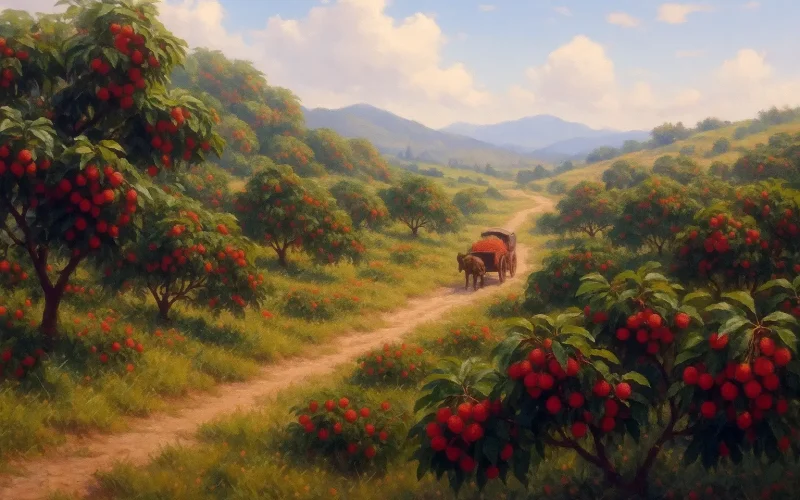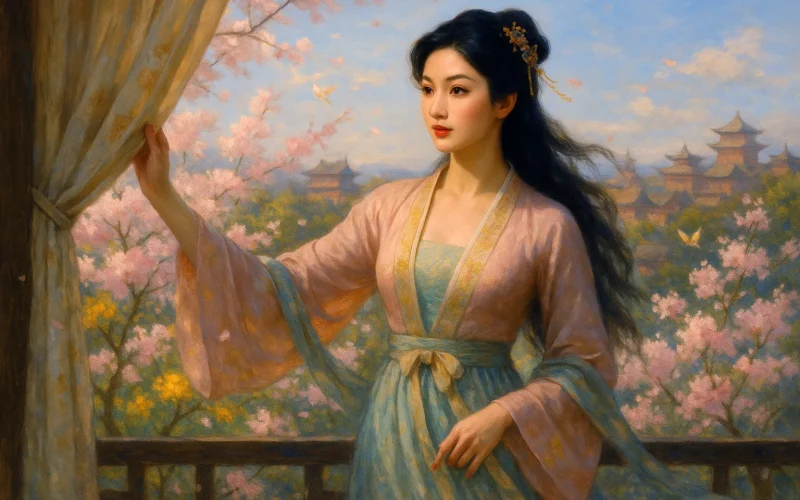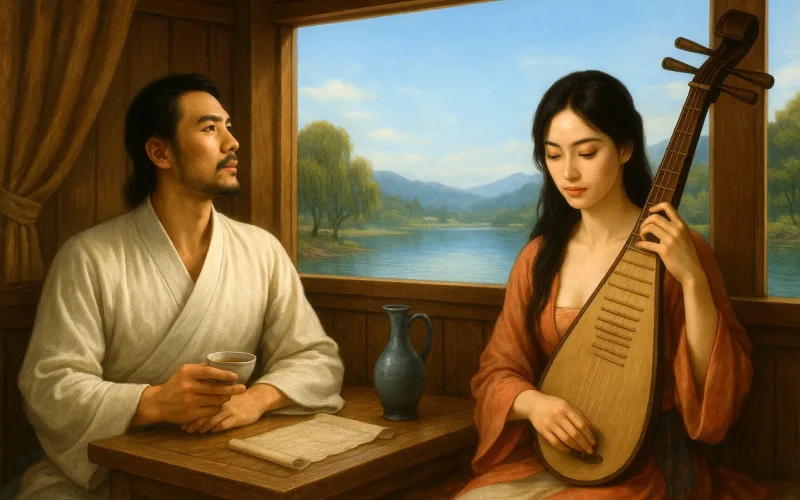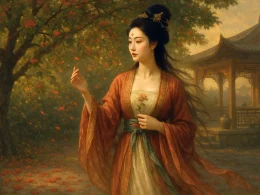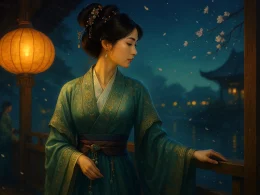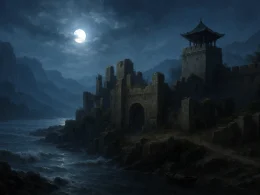The wheat harvest fades in Five-Ridge's embrace;
Lychees begin to blush with crimson grace.
Like crystal balls wrapped in silk of ruby hue—
Why must Heaven place them where none can view?
Far, far away from the capital they grow.
I recall those Kaiyuan days long ago,
When the Imperial Concubine prized this fruit.
Since her perfumed soul left Mawei's bloody route,
No couriers gallop with lychees today—
Only red dust veils Lishan's mournful way.
Original Poem
「浪淘沙 · 五岭麦秋残」
欧阳修
五岭麦秋残,荔子初丹。
绛纱囊里水晶丸。
可惜天教生处远,不近长安。
往事忆开元,妃子偏怜。
一从魂散马嵬关,只有红尘无驿使,满眼骊山。
Interpretation
Composed during the Northern Song dynasty, this lyric employs the Tang Emperor Xuanzong and Yang Guifei's story as a historical mirror, reflecting on the cyclical rise and fall of power. Through the vignette of imperial lychee deliveries—a decadent practice that exhausted state resources—Ouyang Xiu critiques contemporary political extravagance, revealing his Confucian concerns amid mid-Song societal upheavals.
First Stanza: "五岭麦秋残,荔子初丹。绛纱囊里水晶丸。可惜天教生处远,不近长安。"
Wǔ lǐng mài qiū cán, lì zi chū dān. Jiàng shā náng lǐ shuǐ jīng wán. Kě xī tiān jiào shēng chù yuǎn, bù jìn Cháng'ān.
Southern ridges: wheat harvest done,
Lychees blush vermilion.
Red gauze cradles crystal spheres—
Pity Heaven placed their home
Beyond the capital's reach,
These distant, dazzling souvenirs.
The stanza constructs a sensory paradox: the "crystal spheres" (水晶丸) embody perfection, yet their geographical exile (生处远) underscores imperial overreach. The "red gauze" (绛纱囊), evoking both fruit husks and royal wrapping, becomes a metaphor for how power cocoons itself in delusion. The tonal shift at "pity" (可惜) unveils the poet's critique—nature's bounty corrupted by human excess.
Second Stanza: "往事忆开元,妃子偏怜。一从魂散马嵬关,只有红尘无驿使,满眼骊山。"
Wǎng shì yì kāi yuán, fēi zi piān lián. Yī cóng hún sàn Mǎwéi guān, zhǐ yǒu hóng chén wú yì shǐ, mǎn yǎn Lí shān.
Memory revisits Kaiyuan's prime,
That concubine so prized.
Since her ghost scattered at Mawei Slope,
No couriers ride—
Just crimson dust swirling
Over Lishan's barren side.
The historical pivot at Mawei Slope (马嵬关), where Yang Guifei was executed, transforms the lyric into a memento mori. The vanished "couriers" (驿使) symbolize collapsed systems, while "crimson dust" (红尘)—at once recalling lychee hues and blood—drapes the landscape in post-apocalyptic silence. Lishan's emptiness (满眼骊山) becomes the visual echo of power's ephemerality.
Holistic Appreciation
This lyric poem weaves historical allusions with delicate natural imagery, creating a work rich in emotion and subtlety. The first stanza vividly depicts the ripening of lychees through scenes like "wheat harvest fading in the Five Ridges" and "lychees first blushing red," painting a vibrant and tangible picture that sets the stage for the emotional depth of the second stanza. The latter shifts to historical reflection, recounting the favor and tragedy of Consort Yang, symbolizing the transience of power and the impermanence of life. Blending scene and sentiment, reality and imagination, the poem mourns the splendor of a bygone golden age while critiquing the extravagance of the powerful, expressing the poet’s profound contemplation of historical rise and fall, as well as his concern for contemporary realities.
Artistic Merits
The language of this lyric poem is concise yet profound, employing historical allusions and vivid metaphors to build a richly layered artistic conception. Ouyang Xiu excels in detailed depiction—phrases like "wheat harvest fading" and "lychees first blushing red" are both concrete and symbolic, enhancing the visual and temporal texture. The seamless fusion of natural imagery and historical narrative allows emotion to flow naturally, conveyed with restraint and philosophical depth. The structure is tightly composed, with the two stanzas echoing each other, showcasing the poet’s masterful artistry and deep cultural refinement. Though the poem carries undertones of critique, it is expressed through poetic elegance, leaving room for contemplation.
Insights
Through the depiction of lychees’ ripening and their imperial delivery, the poet reveals the themes of historical flux and life’s impermanence. Behind the veneer of luxury lies the decay of power and social upheaval, serving as a warning against the hidden crises beneath prosperous facades. The poem advises later generations to view wealth and glory with equanimity, to rationally examine the patterns of historical cycles, and to caution rulers against excess while valuing the welfare of the people. Ouyang Xiu’s work reflects his keen historical insight and concern for contemporary governance, embodying the traditional scholar’s spirit of "worrying for the nation and its people."
About the Poet
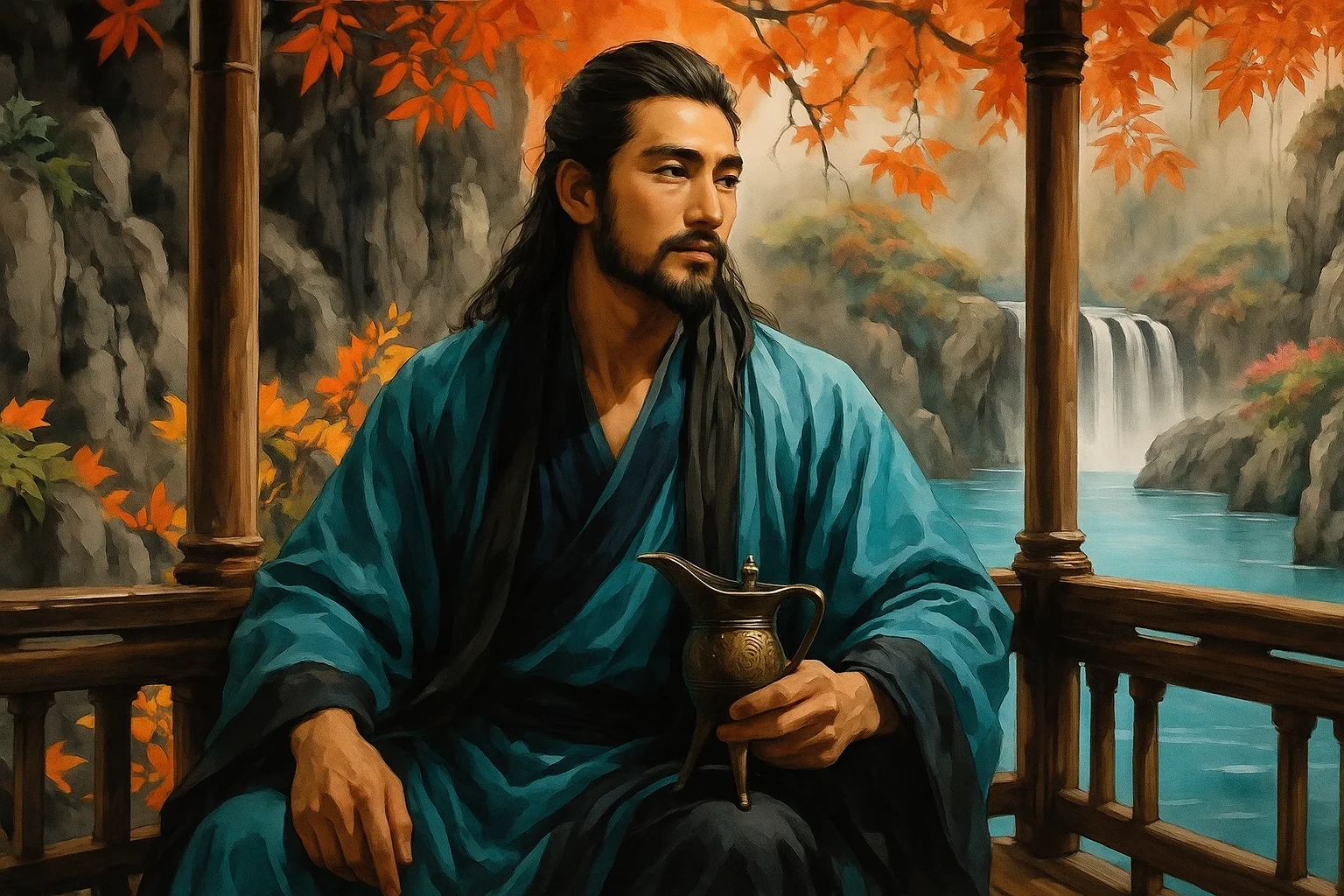
Ouyang Xiu (欧阳修, 1007 - 1072), a native of Yongfeng, Jizhou (present-day Jiangxi Province), emerged as the preeminent literary figure of the Northern Song Dynasty. After attaining the jinshi degree in 1030, he spearheaded a literary reform movement that rejected the ornate Xikun style prevalent at court. As a mentor who nurtured literary giants like Su Shi and Zeng Gong, he laid the foundation for the golden age of Northern Song literature. Recognized as one of the "Eight Great Prose Masters of Tang and Song," Ouyang stands as the pivotal figure in the transformation of Northern Song literary culture.






